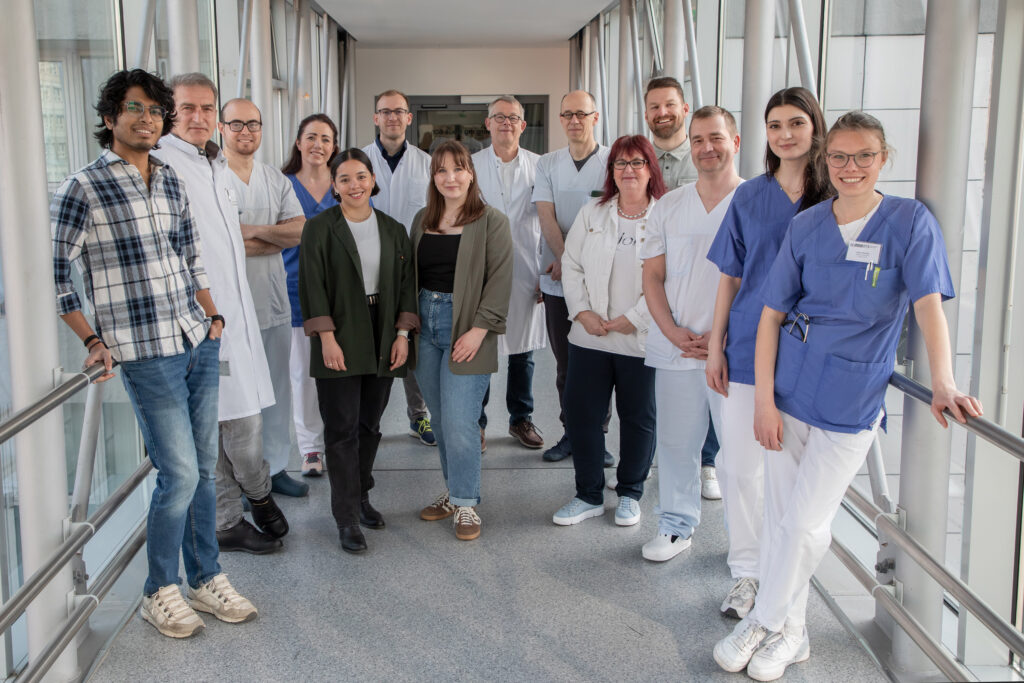NEW STUDY
Heart attack & stroke: Can telemedicine better protect patients at risk?
Heart attack & stroke: Can telemedicine better protect patients at risk?
High blood pressure, obesity, lack of exercise - measurable factors that put a strain on our cardiovascular system and increase the risk of a heart attack or stroke. These correlations have long been known in medicine - but in conjunction with today's possibilities of digital medicine, innovative opportunities for prevention are opening up. This is precisely where a pioneering study at Magdeburg University Hospital comes in: A team of researchers led by Dr Patrick Müller is investigating how new telemedical technologies can be used to improve the care of high-risk patients.

Herzinfarkt & Schlaganfall
Cases of the disease in Germany
The DIKAP study: Telemedicine for heart health
With the interdisciplinary study "Digital Cardiovascular Prevention" (DIKAP) Magdeburg University Hospital is currently launching the largest study on cardiovascular primary prevention in Germany. With the help of the SaniQ telemedicine platform, the study funded by the European Regional Development Fund is investigating how digital solutions can contribute to the prevention of serious cardiovascular diseases.
"Telemedical patient care is already established in the field of heart failure. Our study is intended to provide scientific evidence to transfer telemedical approaches for high blood pressure to the standard care provided by health insurance companies," explains Dr Patrick Müller, head of the study and cardiologist at the University Clinic for Cardiology and Angiology Magdeburg.
Ein TV-Beitrag zur DIKAP-Studie des MDR (19.05.2025):
What makes the DIKAP study special is its holistic approach. The University Department of Cardiology and Angiology is working closely with the University Department of Neurology, the Institute for Inflammation and Neurodegeneration at Otto von Guericke University Magdeburg and the German Centre for Neurodegenerative Diseases.
How can the risk of strokes and heart attacks be reduced with the help of telemedicine? effectively?
The figures speak for themselves: "A reduction in systolic blood pressure of just 10 mmHg can reduce the risk of heart attack or stroke by up to 30 per cent. This is exactly where our study comes in," emphasises Dr Müller.
The study focuses on the telemedical care of high blood pressure patients. Through continuous telemonitoring of key vital signs and prompt adjustments to therapy, the scientists hope to achieve better results than with conventional care, where patients only visit the practice sporadically.
The 12-month study combines various digital medical elements:
- Digital training courses: Participants receive comprehensive information on cardiovascular risk factors.
- Telemedical monitoring: Blood pressure, weight, physical activity and the medication plan are monitored via a telemedicine platform.
- Personalised support: Regular telemedical visits by doctors or cardiovascular prevention assistants ensure personalised therapy.
"Telemedicine offers enormous opportunities to ensure a high level of care in rural regions."
Dr Patrick Müller
University Clinic for Cardiology and Angiology
Otto von Guericke University Magdeburg

On the way to the digital standard care
The study could make a decisive contribution to establishing telemedical approaches in the treatment of high blood pressure as a standard service provided by health insurance companies. This would not only improve the quality of life of many patients, but could also save considerable healthcare costs by preventing secondary diseases.
The SaniQ platform provides doctors and patients with a tool that helps them to continuously monitor relevant health values and take countermeasures in good time. This continuous care could be the key to more effective prevention.
The DIKAP study thus marks an important step towards more preventive, personalised and digital healthcare - with the aim of sustainably improving the heart health of the population and preventing life-threatening events before they occur.
Sources:
- Heart attack diagnosis frequencies (main diagnosis ICD I21, I22) from the case-based hospital statistics of the Federal Statistical Office.
- Scientific Institute of the AOK 2024
- Website of the DIKAP study: http://dikap.med.ovgu.de/
These articles might be of interest to you:

Wie Remote Patient Monitoring die klinische Nachsorge neu definiert
Die Entlassung aus dem Krankenhaus markiert heute oft das Ende der Versorgung. Der Patient wird in ein Vakuum entlassen, das durch unklare Verantwortlichkeiten, fehlende Kontrolle und hohe Rückfallquoten gekennzeichnet ist. Dabei gibt es längst eine bessere Lösung – medizinisch wie ökonomisch:
Telemonitoring- und Hospital-at-Home-Programme schließen die Versorgungslücke zwischen Klinik und Zuhause.

Remote Patient Monitoring for COPD
When will Remote Patient Monitoring for COPD become an integral part of standard care? Initial studies were promising - now a study project funded by the G-BA is set to provide clarity. In this article, we shed light on the current state of research and show what a sensible implementation could look like.

